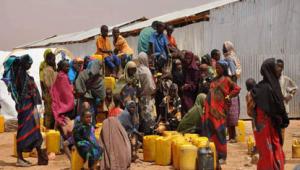Every day, decisions taken by governments impact the lives of many more people than the small group making the call. Nowhere is this more evident than the negotiations happening in the lead up to the Third Financing For Development (FFD) Summit in Addis Ababa, which runs from 13-16 July. Over the past few months in New York, around 200 government representatives have been debating a global financial framework that could have life-changing repercussions for the billion people currently living on less than $1.25 a day.
The opportunity is great. If the summit delivers a strong outcome next week, it could ensure the end of extreme poverty by 2030, creating a more prosperous, stable and fair world for all. From the latest round of negotiations, however, it appears that governments may be letting this chance slip through their fingers.
To ensure the opportunity is seized, it must deliver on two key public finance areas: agreeing a social compact that sets a minimum level of funding for basic services, and focusing aid on those who have the least.
The case for focusing Official Development Assistance (ODA – or simply ‘aid’) on the least-developed countries (LDCs) is clear and compelling. Across these 48 countries 43% of people are living in extreme poverty, and the share of the world’s poorest living in LDCs is set to increase – by 2030 50% of people living on less than $1.25 a day will be in an LDC. If donor governments ensured that 50% of ODA went to the LDCs, it could have provided an additional $26.5 billion in 2014 for the world’s poorest people.
Worryingly though, it appears that aid to LDCs is decreasing despite the clear need and urgent imperative. In September, world leaders will be signing up to the new Sustainable Development Goals (aka The Global Goals). These 17 goals and targets have the ambitious aim to end extreme poverty by 2030, as well as ending hunger, achieving gender equality and halting climate change among 13 other areas.
Achieving these goals in the LDCs, where government revenues on average are less than $300 per capita, will be impossible without targeted external support. It’s a matter of political will, and countries can prioritize their aid portfolio to focus 50% on LDCs over the next five years, while still using the other half of aid spending to support other countries. Belgium and Ireland have already publicly committed to the target.
Aid focused on the poorest countries can also help shore up another key priority at the summit: a social compact among governments and citizens to establish a minimum level of funding for basic services.
Setting a minimum that governments must spend on essentials such as health and education would mean that millions more people would have the security of wellbeing within reach. ONE is calling for a minimum target of $300- $500 purchasing power parity per capita or 10% GDP (whichever is greater), though countries must set appropriate national levels for their specific circumstances.
As noted in The 2015 DATA Report, across all developing countries, the gap to this minimum level of spending equates to $152bn, $34.5bn of which is accounted for in the LDCs. Filling this gap, through more focused domestic spending, supported by development assistance, is a clear example of how public finance could literally change – and save – lives.
Delivering this spending effectively is contingent on open and transparent data. There is a poverty of data across developing countries – with large swaths of data on development outcomes grossly out of date, or non-existent. Consider that only one in five births worldwide occur in countries with complete civil registration systems. The summit can – and must – make commitments to invest in better data collection, transparent reporting and use, so that citizens and governments can monitor spending and measure results.
Achieving these new global goals will not be possible without a concerted focus on the poorest people, in every country. Without additional international support to the poorest countries with the least resources, they will get left further behind.
Leaders must seize the opportunity in Addis Ababa to work together and coordinate resources where they will have the biggest impact. One billion people are counting on them.













